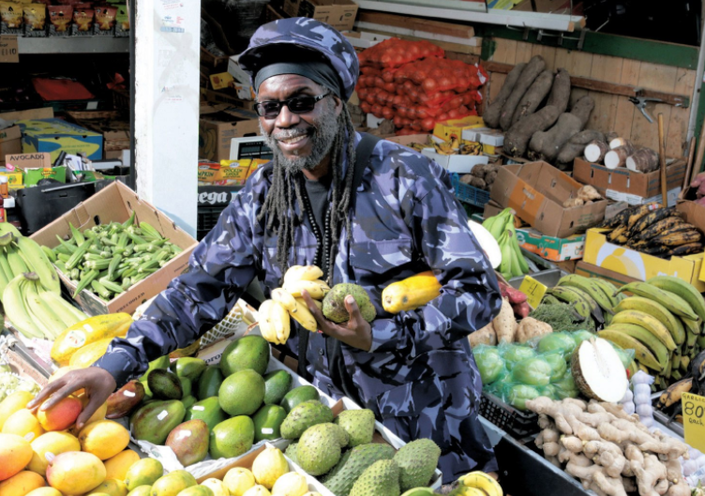|
"Let food be thy medicine and medicine be thy food" - Hippocrates "If you nuh get it you will lose, mek you food be you medicine, you medicine you food, blend up the carrot wit the lettuce inna juice, nuh 'fraid fi mix the vegetable wit the fruit. Spirulina wha me drink fi mi dinna" - Chronixx Photo Source: Greensleeves Records It was a Rastaman who first told me to remove meat and dairy from my diet. Long before I even knew what a vegan was, I was familiar with ital living, the Rastafari way of life that not only dictates diet, but is couched in an active resistance against the systems of oppression that have brutally removed the descendants of slaves from their roots. Before veganism even started to hit the mainstream, the rejection of foods that were thought to cause illness and further enslave the bodies and minds of Black people was integral to the Rastafari way of life. "Ital means "springing from the earth, earthy, natural," or organic... One of the ills of Babylon, according to Rastas, is its departure from naturalness and its commitment to artificiality. Thus the Rastafarian ideal proscribes the use of synthetic materials and chemically treated foods... Ital living also means that Rastas are basically vegetarian, rarely eating meat and strictly prohibiting the use of pork, shellfish, and scaleless fishes, especially those that are predators. The strong disapproval of fish that are predators results from the belief that eating them would be an implicit approval of their "human predator" counterparts." - Ennis Edmonds, Rastafari: From Outcasts To Culture Bearers, Oxford University Press, 2003 Rastafari has been unfairly reduced to a stereotype by mainstream media, through imagery that depicts them as mindless, weed-smoking caricatures. However, this couldn't be any further from the truth. As Jamaican culture has rapidly Westernized, it is through the Rastafari way of life that old wisdom continues to persist. The knowledge and reverence of medicinal herbs - both to eat and to smoke - has served as a source of healing for those who have found themselves seemingly abandoned by the medical establishment. That's how I felt - abandoned - when I found myself seeking the consultation of a Rastaman with knowledge of indigenous healing. I'd spent my entire life up until that point going from doctor to doctor seeking respite from countless ailments, but to no avail. The solution was always a prescription for some medication or another or the empty, clueless shrug of shoulders which indicated "I cant help you". During this consultation, I marveled at the youthful glow this old Rastaman possessed. Though his hair was pure white, he looked younger than me! I knew he must have the answers. And he did. But I didn't listen. Call it youthful ignorance, as I was in my early twenties at the time, but I didn't stick with the plan that he laid out for me. I won't lie. It was difficult. I felt restricted in what I could eat, I hated the taste of the herbs and concoctions that I was made to drink, and it was all too much for me at the time. It was only a matter of time before I ended up going back to my old ways, and inevitably, getting sicker. However, I never threw out the paper upon which he'd written my dietary plan. I kept it posted on my fridge - for years. It was only last year, after being vegan for a few months and feeling absolutely amazing, that I looked back upon that paper and realized that, though it took me many years, I'd eventually found my way back to the very same diet plan that he'd suggested for me. I knew he was wise; I only wish that I had been wise enough at that point to listen. His existence, his knowledge, and the ital lifestyle in general has proven invaluable to those of us in the diaspora who feel that they have no other option. I've heard countless stories of Caribbean descendants who, after finding no help from their doctors, finally found healing through the herbal knowledge of a "bush doctor". This kind of "alternative" medicine is the entire point of the Rastafari way of life - to get back to our roots, to find healing and respite from the physical, mental and spiritual damage that has followed us since the first days of colonization. When all else fails, we can go back to our roots. I don't consider myself a Rasta, though I am married to one. It would also be disingenuous of me to not mention that not all Rastas exclude meat and dairy from their diet. As with any way of life, there are people who follow the tenets to varying degrees. However, it can generally be said that the ital diet is a crucial aspect of the Rasta way of life, and it has become a healing salve for many who have sought health but were previously unable to find it, especially in Caribbean immigrant enclaves like the one I grew up in. Even to this day, the only vegan restaurants available in the Bronx serve ital and Jamaican vegan dishes. While no one else seems to want to serve us food that serves to heal, the Rastas have been doing it for years. This is why I find it utterly laughable that even in 2018, there are many people who still can't even fathom the notion of a Black vegan. Not only is this a supremely narrow-minded view of Blackness that serves to minimize us all to stereotypes, but it is an ignorant form of erasure that undermines the radical, grassroots work of Black people who have long sought to change lives through changing diets. For so many of us, veganism wasn't initially a conscious decision as much as it was the only thing that finally brought us some healing. Nowadays, the plant-based Rasta ideals are becoming more and more mainstream, with amazing people like Macka B who, in true Rastafari fashion, uses music to preach the medicinal benefits of plant foods to the masses. Similarly, Grammy-nominated reggae artist Chronixx made an entire song titled Spirulina (featured below), where he also promotes the importance of making your food your medicine. In some of his other songs he openly criticizes the Jamaican government for pushing junk food on the populace, as well as the absurdity of saltfish being part of the nation's national dish. For Rastafari, promoting healthy foods and criticizing the establishments which do the opposite are all integral parts of the same movement. Just like veganism, the consideration of the food that one consumes is not only about improving one's health, but also about the greater struggle against oppression. The only difference is that there's a certain level of privilege attached to the ability to make the dietary change solely about animals. For Rastafari and Black vegans in general, the struggle against systemic oppression isn't new, it's been an ongoing struggle. Animal abuse is just another form of oppression to add to the list. Veganism may be widely considered to be a "White" thing, but it is honestly, anything but. The movement as a whole is about dismantling systems of oppression by making the conscious decision to not partake in harmful practices that are the foundations of those systems, and whether people want to admit this or not, poor dietary habits rooted in trash food options pushed upon people by corporate and governmental establishments is a part of that system of oppression. Rastafari proves that the ideals behind veganism - to reduce harm - aren't confined to animal-loving White hippies, but have long extended across racial lines and across borders to those who are still fighting to prove that their lives matter, too.
17 Comments
|
AuthorMy name is Nivea, but you can call me Niv. I'm an independent Plant-Based Nutrition & Fitness Coach hailing from the Bronx, NY. Archives
August 2021
Categories
All
|



 RSS Feed
RSS Feed